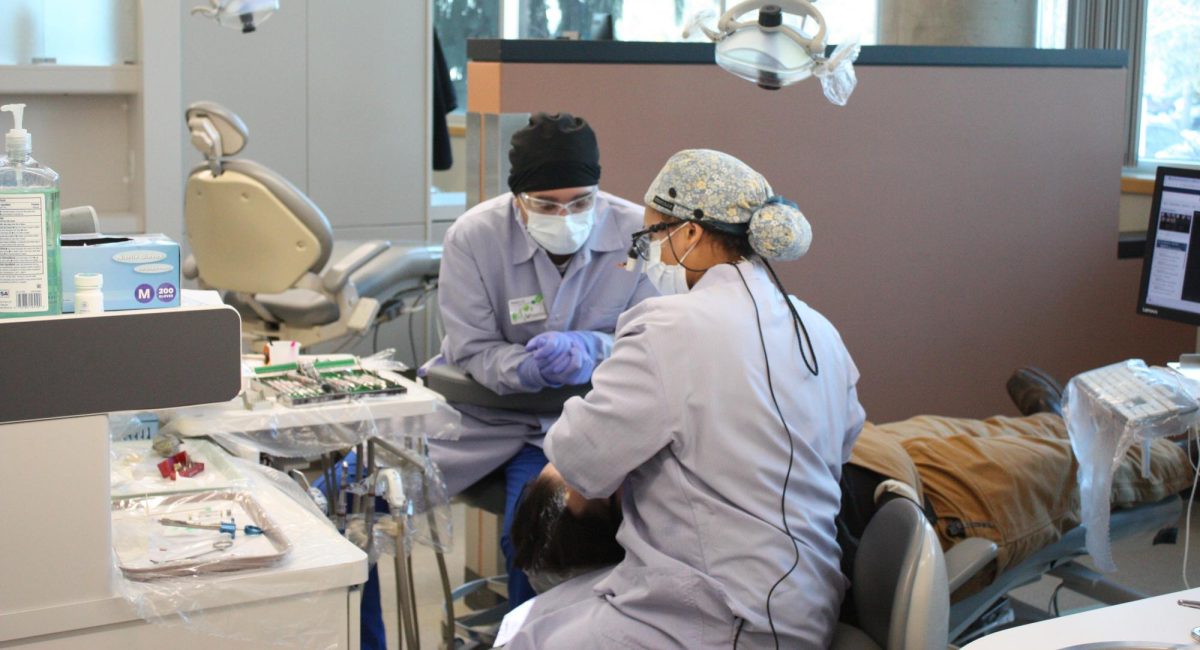EWU Deputy Chief looks back on lifetime in law enforcement

May 1, 2013
This article has been corrected to state that Wally Davis was a sheriff’s deputy for Clallam County and died in 2000. The original article stated that Davis was a Washington State Patrol deputy and died in 1998.
A wooden plaque with “Award of Merit” stamped in black and gold stood alone on Deputy Chief Gary Gasseling’s office wall.
He gingerly removed it from its place and turned it over in his large, leathery hands. On the back were two yellowed newspaper clippings. The first told of a Clallam County sheriff’s deputy named Wally Davis, who had been shot and killed in Clallam County in 2000. The second clipping, slightly less faded, reported the death of the man who had murdered him. He died of natural causes in prison.
Gasseling, then working with SWAT for the Washington State Patrol, was among those sent to apprehend the man who had shot one of their own. The suspect, Thomas Roberts, was holed up in his house with a shotgun. After a grueling 25 hours of tear gas and strained negotiations, Roberts finally surrendered.
“That’s when the system works,” said Gasseling “When no one gets hurt and the suspect is apprehended.” After more than 30 years in law enforcement, Gasseling has come to look upon outcomes like this one as the most important and satisfying of his career.
“I’ve got a very strong Christian background, so that helps me keep making those decisions,” he said.
“You place yourself in harm’s way [as an officer], but you can’t push yourself into a harmful situation and force the issue.”
He believes that if an officer comes into a dangerous setting with the mindset that they are going to have to shoot someone, the situation is going to escalate to that point very quickly.
Gasseling’s journey began at WSU, where he started as a cadet with the campus police. During the time he spent there, he was strongly influenced by the state troopers he came to know. “I saw the respect and almost awe when [people] see that state police badge.”
After two years with WSU police, Gasseling was offered a position as a corporal, but he turned it down. Although he said he benefitted from his time with the WSU Police, he was after more challenging prospects.
“If you get bored, you start slipping,” said Gasseling. “I wasn’t challenging myself.”
In 1980, Gasseling was hired by the state patrol and was assigned to the governor’s mansion in Olympia along with nine other cadets. By 1983, he graduated from the state patrol academy.
One of the things he learned during his time with state patrol was the importance of taking painstakingly detailed reports for every incident. He would keep a tally each time he made a DUI arrest, and on the first page of the police report Gasseling would mark the number down. If a public defender or prosecutor noticed the number in court and asked about it, Gasseling would explain that the number represented the total DUI arrests he had made.
“If you write up a good report and the defenders see that you have experience, they respect that. You build up a reputation,” he said.
Gasseling had spent seven years working the road, but he said he grew tired of the drunk drivers and the deaths he so often encountered.
So, he made the decision to take a desk job working in human resources in Olympia, Wash. While he was there, he hired over 200 state troopers. He said that even though there was a stigma that came along with taking a “cushy desk job,” it was more challenging than anything he had done up to that point. “That was one of the most difficult jobs,” he said.
Gasseling said the most valuable lesson he learned during that time was that “people will lie to save their skin. It doesn’t matter whether they are wearing a uniform or whether they are an average citizen. … It was a hard lesson that even my own people will lie [to protect themselves],” Gasseling said.
Always looking for the next challenge, Gasseling soon found another arena in which he could push himself to the limit. By 1985, Gasseling was on the state patrol SWAT team, where he would stay for the next 20 years.
“I wanted to be the leader of that group. … I was a motorcycle cop for four years in [Tacoma, Wash.] Only about 40 people could do that. I wanted to be one of the few.”
That exclusivity gave him some rare opportunities, including the chance to work as a dignitary escort for high profile individuals, such as presidents Reagan, Clinton and Bush. As he reflected on that period in his life, Gasseling said, “You look back on the things and people you get to be involved with, and it was just phenomenal.”
In 1996, Gasseling began spending a good deal of his time in charge of raid planning, busting meth labs in all 32 counties in the state. “I’ve [raided] over 1,000 meth labs in my career,” he said.
“We saw a lot of kids in these meth houses,” he said.
He was deeply affected by what he saw and recognized that there were very limited facilities available for people to be treated for meth addiction. This spurred him to start working with meth action teams to try to make a difference beyond making arrests, which required a good deal of travel.
But, Gasseling said, his passion and intense focus on his work was not without a price. His home life suffered, and it was during this time that he went through a divorce.
In 1999, Gasseling found himself standing in the ranks of officers charged with the task of containing the chaos that was the World Trade Organization riots on Seattle’s Capitol Hill.
“That was two weeks of hell.”
“It was very strange,” Gasseling said. “If you were [in the downtown area] after 10 p.m., you had to have a badge or you would be arrested. … I was thinking, ‘This must be what it was like in WWII Germany.’ It didn’t feel right.”
One image stood out vividly in Gasseling’s memory. He described a moment during the protests when his eyes fell on a young man, probably no more than 18 years old, stomping wildly on a sign bearing the Nike logo. On those outraged feet were a pair of Nike shoes. “These kids didn’t even know what they were protesting about,” Gasseling said.
Gasseling described how the tension would mount among the officers, decked out in riot gear, trying to keep calm and follow orders while things escalated around them. Inevitably, at some point one of the officers would get frustrated, break the line and charge forward.
“People scattered like quail,” he said. “Thankfully, we made it through without any serious injuries.”
“Some nights I wore a gas mask for six hours straight.”
Things have slowed down a little for Gasseling since then, but he continues to look for new ways to put his experience to work and to seek out new challenges. Six years ago, Gasseling came to EWU, where he currently works as deputy chief of EWU Police. “I wasn’t getting any younger,” said Gasseling, “and I wanted to make an impact here.”
Corporal Elvin Bermudez, who was recruited by Gasseling in 2008, seemed to think that Gasseling has succeeded in his goal.
Bermudez explained that he first met Gasseling when he was working as an ROTC instructor at EWU. “I came in to get my fingerprints done to go apply for work in corrections … [Gasseling] came up to me and said, ‘You don’t want to do that, do you?’”
Bermudez soon found his place with the EWU Police and has no plans to leave. “They can’t get rid of me here,” he said. “This is the best job I’ve ever had.”
Bermudez said that after 20 years in the military, he has seen many different kinds of leadership and that he appreciates how things are done at Eastern.
“The leadership is outstanding,” he said. “They take care of us here and they include us in decision making.”
It was Gasseling, according to Bermudez, who first recognised his aptitude with weapons and suggested that he go into weapons instruction. Now, Bermudez is EWU Police’s weapons instructor. In that capacity, he conducts quarterly weapons training courses and inspects weapons used by campus police officers.
Speaking about Gasseling’s effect on the officers he works with, Bermudez said, “We go out and do our best for him, because we know we are representing him as well … That’s why we rank number one safest campus in Washington.”
Gasseling said he has worked to encourage an atmosphere of respect and confidence among the officers on campus. “There’s a fine line between cockiness and confidence,” he said. “We want to be accountable.”
One of the things he has grown to appreciate about working on a college campus is the opportunity to build relationships and to have a lasting impact on the people here. He said that when students run into trouble, they want to do more than make arrests.
“We don’t want to be the belt running through and punishing people.” said Gasseling. “We want to follow up with these kids.”








